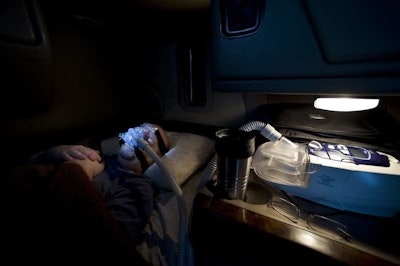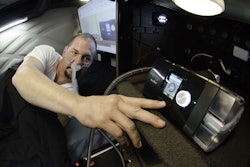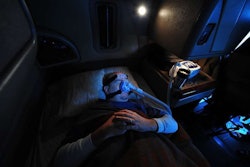 Carriers can legally require truckers with a high body mass index to be tested for sleep apnea, the Eighth Circuit Court of Appeals ruled.
Carriers can legally require truckers with a high body mass index to be tested for sleep apnea, the Eighth Circuit Court of Appeals ruled.A federal court has ruled that Crete Carrier Corp. is within its legal boundaries to require truckers at the company to be tested for sleep apnea if their body mass index is greater than 35.
The Eighth Circuit Court of Appeals issued its decision Oct. 12, calling Crete’s 2010-instituted policy “legitimate and non-discrminatory.” The Eighth Circuit court is outranked only by the U.S. Supreme Court, meaning the verdict is likely to stand, at least until FMCSA issues a formal rule regarding sleep apnea screening requirements, which could be years away.
The Eighth Circuit decision likely sets a precedent for other courts who could hear similar cases involving other carriers’ required testing programs for sleep apnea.
The court ruled that Crete did not violate the Americans with Disabilities Act, as was argued by the driver plaintiff in the case. The three judge panel also ruled Crete’s required-testing program is legal per prior court rulings. Judges on the panel included Circuit Judges James B. Loken, Raymond W. Gruender and Duane Benton.
The Crete case before the Eighth Circuit involved Crete driver Robert Parker, who refused a sleep study in 2013 as part of Crete’s program. The program requires drivers with a BMI of 35 or greater to have an in-lab sleep study. The carrier also requires drives whose medical examiners recommend apnea screening to be seen for an in-lab test.
Following a visit to his doctor, who wrote a note to Crete saying he didn’t think a sleep study was necessary, Parker refused to comply with Crete’s order to be tested for sleep apnea.
Crete then suspended Parker and never reinstated him as a driver. Parker subsequently sued for wrongful termination.
The three-judge panel on the Eighth Circuit bench cited prior court precedent in upholding Crete’s policy and, specifically, its order for Parker to be tested. The judges said prior court rulings have found employers can require medical exams to identify whether employees “can perform job-related duties when the employer can identify legitimate, nondiscriminatory reasons to do doubt the employee’s capacity to perform his or her duties,” according to court documents.
“Crete established…sleep apnea tends to impair driving skills, increasing their risk of motor vehicle accidents by 1.2- to 4.9 fold. A sleep study is the only way to confirm or rule out an obstructive sleep apnea diagnosis,” the judges wrote. “The sleep study requirement is job-related because it deals with a condition that impairs drivers’ abilities to operate their vehicles. It is consistent with business necessity.”
The Federal Motor Carrier Safety Administration’s Medical Review Board recommended just this year that the agency institute a rule to require truckers who meet certain requirements — such as an elevated BMI — to be required to undergo apnea screening.
The MRB’s recommendations were only recommendations, but FMCSA will likely use them in any potential rule it develops regarding apnea screening and treatment for the trucking industry.
No rule is formally in the works, yet.
A study issued earlier this year showed truckers referred to sleep apnea screening incur the bulk of the testing costs, which can run into the thousands of dollars, especially for uninsured drivers.











